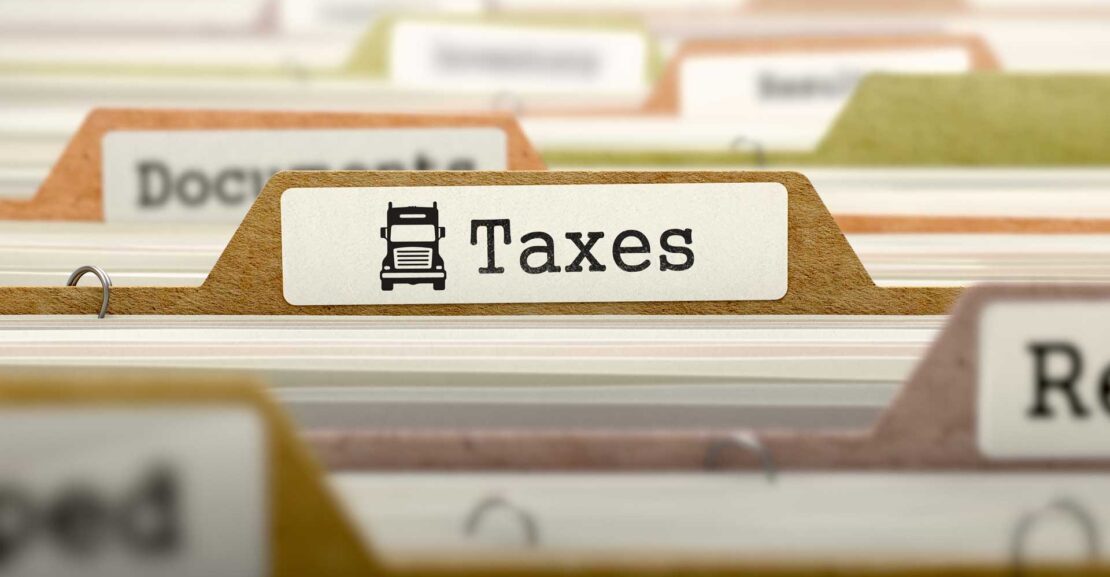Trucks and Taxes: Understanding Your Tax Obligations

While no one looks forward to tax season, it can be an especially trying time for fleet managers and owner-operators. It seems new taxes are imposed every year and understanding the ins and outs can make a huge difference. From Federal Excise tax to the Heavy Highway Vehicle Use tax and the more recent per diem tax deduction, for the past 4 years, the state of trucking and taxes seems to be turbulent.
Federal Excise Tax (FET)
The Federal Excise Tax is far from new, as it was first imposed as a way to boost revenue for WWI in 1917. However, since that time the rate has increased from 3% to an incredible 12%.
The FET tax is only applicable with the purchase of a new truck, and is based on the gross weight. For instance, vehicles weighing 33k pounds or more and trailers of 26k pounds incur the FET tax. This excessive tax not only adds several thousands of dollars to a truck purchase, it also results in higher costs for food and various other products Americans purchase.
The FET is incurred by truck owners large and small, regardless if the truck is driven or not or helps generate revenue. The small silver lining in regards to the FET is that it doesn’t generally apply to the purchase of used trucks.
Heavy Highway Vehicle Use Tax (HVUT)
The Heavy Highway Vehicle Use Tax, also referred to as 2290 or Federal Highway Use Tax, is used to help defray costs of highway repairs, maintenance and new construction. The tax is paid annually by all registered truck owners-operators owning or using trucks or trailers weighing 55,000 lbs.
Should a truck be destroyed, sold, or permanently parked, the registered user may be able to claim potential refunds on prepaid HVUT taxes.
Per diem Tax Deduction
The Per Diem Tax Deduction applies to truck owner-operators or drivers who are self-employed truck drivers, and when used properly can save lots of money. “Per diem” is Latin for per day and is used frequently in regards to meal allowances or employer reimbursements for certain travel expenses associated with a haul.
In regards to the per diem tax deduction, drivers can drastically reduce how much they owe on income tax. Unlike other tax deductions, the per diem deduction doesn’t require itemized receipts. Rather if your driving hours take you from your local area/residence and require you to sleep or take an extended break (as per HOS requirements), most likely you qualify for this tax deduction. Plus, if you are part of a driving team, your partner or spouse can claim it as well. Rates vary between full or partial days, so ideally you would track your hours to ensure you take the correct per diem tax deductions.
Self Employed Truck Driver Tax Tips
As a self-employed truck driver, it’s good to be aware of all the deductions available because small expenses can add up during a 12-month period. Keeping track of all expenses associated with driving a truck can help you save money when tax time rolls around. For example, some of the common deductions a truck driver can claim include the following:
- Electronic equipment and services used solely for work, such as internet access, laptop, cell phone, GPS
- truck maintenance and repairs
- license renewal fees
- required union or association fees
- mandatory physical exams, meal expenses, truck and safety equipment, storage boxes, and tools
- truck, health, dental insurance coverage
- travel and lodging costs
It’s important to note that some of items in the list are also included in the per diem deductions. Depending on whether you prefer to take the straightforward per diem route or maintain detailed records and receipt logs.
Get Ahead of Tax Season
Ultimately, you have to acknowledge that tax laws are ever-changing. The tax laws imposed in 2017 had a major impact on trucking companies and their business models, but whether you’re a fleet owner, self-employed driver, or an owner-operator, you have to take taxes seriously. Understanding and planning for your tax obligations is a must-do, and often requires the help of a specialized professional.
The main takeaway? While taxes can certainly feel like a burden, they’re a necessity of being in business, and something that changes from year-to-year. Don’t assume you’re in the clear just because you did things a certain way in previous years and never had an issue. The laws are evolving, and your tax prep should adapt. The best thing you can do is keep detailed records throughout every year and turn to a trusted tax advisor for assistance when it comes time to file.
There’s More Where This Came From
To get more insightful information and News U Can Use about the trucking industry, please sign up for our free newsletter.

